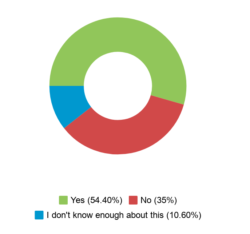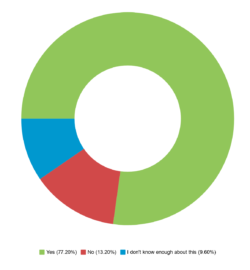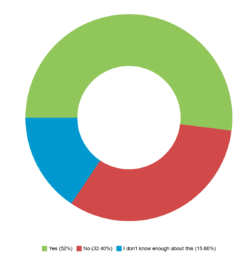What does Warwick think of the UCU strike?
In a survey of 500 Warwick students and staff members by The Boar, 54% of respondents said they supported the UCU strike.
The strike began on Thursday Week 7 and is scheduled to continue at least up to Week 10 unless an agreement is reached between the University and College Union (UCU) and Universities UK (UUK).
The survey was answered almost exclusively by students from the faculties of Arts, Science and Social Science with 4% of responses from staff.
Two-thirds of respondents said they would not be taking any action, with 34 saying they intended to participate in strike action or picketing (at the campus bus interchange) and 78 that they would otherwise support the strike through other action or letters to the University or UUK.
31 students said they intended to take action against the strikes.
The strikes follow a proposed change to teachers’ University Superannuation Scheme (USS), a reform which would make staff pensions dependent on market investments. In an actuarial analysis, the UCU estimates that this could cost employees up to 40% of their pensions, or £200,000 for the average member over the course of retirement.
The first week of the strike, which is taking place across 57 UK universities, has seen a high turnout nationwide despite the drop in temperatures. This week, four more institutions are joining while a total of 64 universities will be taking industrial action in the next two weeks.
With over 1 million students set to be affected and about 575,000 teaching hours lost, the UCU and Universities minister Sam Gyimah have called for UUK to negotiate. Meanwhile, students across the country have launched a number of petitions calling for compensation.
Do you support the staff strike?

In a statement on the first day of strikes, UUK released a statement: “Union leaders need to listen to the concerns of the Pensions Regulator and USS. Pensions risk is very real. The dismissal of the funding challenges is hugely concerning, the very reason employers and the scheme must act responsibly to protect pensions and students.”
UCU general secretary Sally Hunt said “strike action on this scale has never been seen before on British university campuses” in an article for The Telegraph.
She added: “Is anyone aware of another strike where the boss said he “absolutely supported” his striking staff?” Newcastle’s vice-chancellor has come out in favour of the strikes, saying that he didn’t know “what else they could do to express their concerns about the current situation.””
Warwick vice-chancellor Stuart Croft was one of the first university leaders to publicly come out against the pension reforms, and said in a recent statement that the industrial unrest “could have been and, with goodwill on all sides, could still be avoided.”
Although just 54% of respondents to The Boar’s survey said they supported the strike, only 35% were opposed to the action, with 11% saying they did not know enough about it. When asked whether they thought students should support the strike, the proportion in favour dropped slight to 52%, while 16% where unsure or did not know enough about the issue.
Support for the strike was even across year groups. However, at 16%, finalists were nearly twice as likely as freshers to say that they did not know enough about the situation to express an opinion. An overwhelming 77% of respondents supported the right for staff members to strike over the reform.
Do you support staff members’ right to strike?

Although 94% responded that they were aware of the reasons for the strike, 15% said they did not know what the USS pension reform was, with a further 36% saying they did not know enough about it to either support or oppose it. Only 37% were again it, markedly less than those in favour of the strike action opposing it.
At 64% in favour, students from the Faculty of Arts were the most likely to support the strike, and were also the most well-informed, with a third being fully aware of which classes they would be missing as a result of this.
55% of social scientists, of whom only 11% knew exactly which classes would no longer be running, supported the strike. Meanwhile, 48% of Science students supported the strike by, ten points more than those actively against it. Only 5% were completely aware of which classes would continue during the strike days.
Science students were the most likely to say they did not know enough about the strike to support or oppose it, at 14%, while this figure dropped to 9% for Social Sciences, closely followed by Arts.
Although only one tenth of respondents said they were satisfied with the University’s response to the strike (an additional 5 students said they were very happy), 44% were happy with their department’s response. However, the majority were unsatisfied with the response, with 28% saying they the department was very unhelpful and a further 28% saying they were not aware of any information from their academic department.
While 28% said their teachers had not discussed the strike, two-thirds of respondents said that they had neither approached their department nor a member of strike for information. Heads of department and teachers were the most popular source of information about the strikes, closely followed by department emails and word of mouth.
Do you think students should support the strike?

Earlier this month, an SU referendum passed the motion ‘Warwick Students for Fair Pensions,” with 944 votes for, 273 against and 53 abstentions. The referendum proposed that the SU give full public support to the UCU strikes and mandated SU president Hope Worsdale to lobby the University over the pension changes.
The survey found that 36% of respondents were not aware of the referendum taking place, and that a further 24% were aware but decided not to vote.
In an official statement, the SU said the proposed pension changes “represent an unprecedented attack on staff’s working conditions.”
They added: “We understand that students may have concerns about how their student experience will be affected by these strikes. We are in proactive discussion with the University to seek urgent clarification on how this will impact students’ academic experiences, including concerns surrounding assessment and graduation.
“We will lobby the university to implement mechanisms to protect international students’ attendance records during strike days, and we eagerly await an announcement from the University as to how they will be using any forfeited staff wages – we strongly advocate that this money should be invested into supporting students, for example through the hardship fund.”
The 14 days of escalating strikes are set to go on until Week 10, but may stretch into Term 3 if an agreement is not reached.

Comments